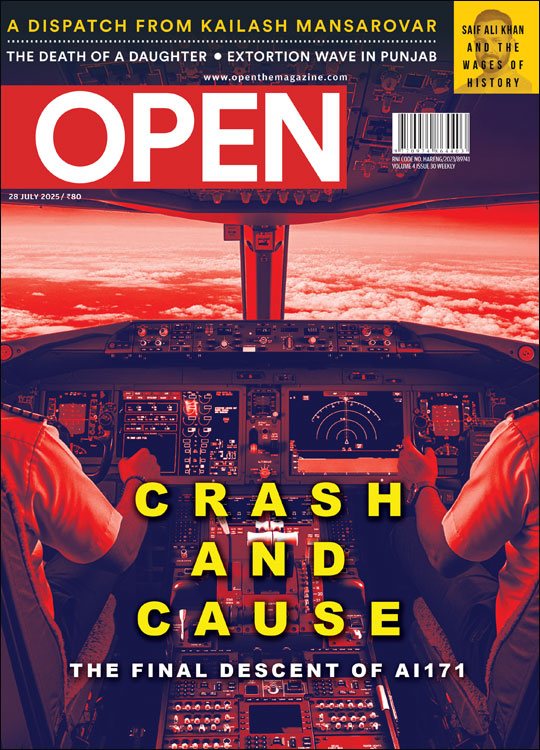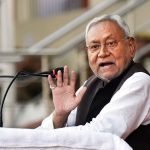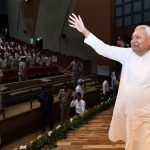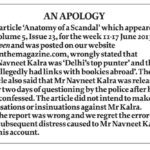Father Davis Chiramel: The Priest Who Gave His Kidney
His kindness and enthusiasm have set off a movement of organ donation
 Madhavankutty Pillai
Madhavankutty Pillai
 Madhavankutty Pillai
Madhavankutty Pillai
 |
12 Aug, 2015
|
12 Aug, 2015
/wp-content/uploads/2016/01/19328.thepriest1.jpg)
On 25 February 2013, Father Kidangathazhe Sebastian got on a bus to Ernakulam at the town of Chalakudy. At a midway stop in Perumbavoor, a man got in and sat next to him. He didn’t look too well and had hospital files in his hand. The priest asked him where he was going and they got talking. Rasad Mohammad was from a place called Haripad in Allapuzha district and he was in distress. He had been working as a mechanic in Saudi Arabia, but then had found his eyesight deteriorating. Medical check-ups had revealed that his kidneys were failing. He had had to return to Kerala, and for a year-and-a- half had been undergoing dialysis. But the ailment had progressively worsened and now doctors had told him that only a kidney transplant could save him. He had not been able to find any donors. An agent had promised to find him one for Rs 2.5 lakh. The man had brought three potential donors, but their kidneys had not matched. A fourth man’s had matched but he backed out at the last minute. And then the agent had got arrested in another case, leaving Rasad marooned.
Father Sebastian heard all this in that bus seated next to him and then, just like that, told Rasad he would give him the kidney. “The only thing I knew was that the blood group should match to donate a kidney. When I asked for his blood group, it was A+. Mine was also A+. I told him if my kidney matches, I’ll give it to him,” says Father Sebastian. Rasad didn’t believe it. The priest took his phone number and called him the next day. He offered to go together to the hospital to check if the kidney would match. “That is when he began to believe,” he says.
He remained true to his word. They went to the doctor, did the tests, and within a month, it became clear that the kidney matched. It took two more months to clear the legal proceedings. He had to get the Bishop’s permission and also his family’s ‘no objection’. Father Sebastian was unsure whether they would agree, so he finished all the formalities and approached them for a go-ahead only after that, pleading that they don’t refuse. But everyone seemed to encourage him. He says that even though there is usually at least a faint anxiety even when people take an injection, in this case he didn’t feel an iota of fear. “It was the grace of God,” he says. On 1 June that year, the kidney was transplanted.
What made Father Sebastian do it? Rasad was 30 but the priest was only 12 years older than him, and 42 is still a young age to give up a kidney, and that too to a stranger. “I saw a man who was seeing death before him and didn’t think of anything else. I knew that we could live with one kidney,” he says. There was also a precedent that he was following. In 2009, he had read in the newspapers about another priest, Father Davis Chiramel, who had given his kidney to a stranger, a Hindu. The gesture had struck him and he remembers thinking that this was something he could also do. And Rasad, as it turned out, was the first time he was coming across a man who needed a kidney. After he made his decision, Father Sebastian went to meet Father Chiramel, who insisted that what he was doing be made public. “I said ‘I don’t want any publicity.’ But he said—and I later realised he was right and agreed with him a hundred per cent—‘We don’t publicise it to make a name for ourselves but to make it an inspiration for others’,” he says.
Eleven priests have given their kidney since Father Chiramel first did it. And it’s not just them alone. About 50 people, across different religious affiliations, have donated this organ to complete strangers. Besides, there have been hundreds who gave kidneys to their relatives and hundreds of thousand who have promised to give their organs away after their death.
Father Chiramel is 55 years old, lanky and bearded, with a nervous energy around him. When he is talking, he tries to be measured—probably a mannerism that comes from public speaking—but otherwise, in body language and gait, there is something of a man in a hurry about him. He does not recollect any specific epiphany that led him to become a priest. He was from a very religious family from Aranattukara in Thrissur. His sisters became nuns and he was himself an altar boy in church. “After [my class 10], there were camps for priesthood. I attended. Decided [on it]. Thirty-eight boys decided, only 10 became priests. Others went back on their decisions. Now 27 years have passed,” he says.
In 2009, he had arrived as the vicar of the parish in a village called Vatanapilly. One day, a few young men came to visit him and said that they had formed a committee to raise finance for the kidney treatment of Gopinathan Chakkamadathil, an electrician. He immediately agreed to be part of it. Soon the committee raised Rs 12 lakh. Getting a kidney donor is almost impossible in India. While there are no accurate statistics, media reports usually quote doctors who estimate that 200,000 patients need kidney transplants in India every year and barely 4,000 to 6,000 actually get one. The only way for most people is close relatives, usually spouses or parents, donating one of their kidneys. In Chakkamadathil’s case, his wife’s kidneys didn’t match his. There are agents who find donors for a price and desperate patients often have no other recourse. Someone on the committee had a relative in Coimbatore who knew an agent, but it was both unreliable and illegal. When Father Chiramel heard about this, he told the committee not to do it and then shocked them by saying that he would give his kidney. Until then, he had not even met Chakkamadathil.
Father Chiramel says that it was an impulsive gesture, one from which he had no intention of backing out. “What did I preach? That if you see someone in need of assistance and you have the means to assist him and if you don’t, then you are committing a sin. That is what we say in church. I thought if we preach this, then when an opportunity comes we can’t shirk away. I didn’t think twice. If you think twice, then we won’t do many things. Because then you think of the risks,” he says.
But he did have an apprehension and that was because someone from the committee told the media and the news appeared on the front page of a newspaper the next day. Journalists had called him and he had told them not to publish it because, while he knew the blood group was the same, tests still needed to be done to see if Chakkamadathil’s body would accept his kidney. “I would have been really embarrassed [if it didn’t match]. But God helped me,” he says.
He also faced pressure from family, friends and even his superiors in the church to retract his decision. Until then, no one in the church had done anything like this. But he was adamant.
Chakkamadathil, who received the kidney, remembers going to meet Father Chiramel for the first time after hearing about the decision and even asking him not to do it. “He told me, ‘Don’t be afraid. It will all be solved.’ And then everything happened at great speed.” His friends and Father Chiramel worked relentlessly to clear the enormous amount of paperwork. “Father is very fast and determined when he makes up his mind about something. In two to three months, the transplant happened. I have a good life now. If I leave at 8 in the morning to go for work, I will be out till 8 or 9 in the night. It was the hand of God that made Father come to my village and [helped] me return to my life,” says Chakkamadathil.
Because of the nature of Father Chiramel’s kidney donation— the first priest to do it and that too to a Hindu—the news got enormous traction. Even before the surgery, other kidney patients and their relatives started calling Father Chiramel to ask for assistance. He was also being exhorted not to give away his kidney by well-wishers. One such person was a businessman from Sharjah who asked him how much the kidney transplant would cost. When he was told Rs 5 lakh, the businessman immediately wrote a cheque, gave it and asked Father Chiramel to give it to Chakkamadathil instead of donating his own kidney. He refused to do it but didn’t return the money either. This became the corpus for the Kidney Federation of India, an organisation he envisioned to assist all those who had kidney ailments. Its inauguration took place at the operation table during the transplant itself at Lakeshore Hospital in Thrissur.
After the surgery, Father Chiramel spent a month recuperating at a retreat and when he returned was surprised at how curious people were to see what had happened to him. “Some thought I must have died. I realised people wanted to know what would happen if a kidney was donated,” he says. So four months after the surgery, Father Chiramel went on a 20-day journey from one end of Kerala, Kasaragod, to the other, Thiruvananthapuram, to create awareness about kidney donation. He would have meetings along the way and ask kidney patients whether he could stay overnight with them to know of their life. “I saw kidney patients who couldn’t sleep at night thinking they could die if they slept, people who had not passed urine for 10 years because urine gets stored in their body which only dialysis can filter out. Kidney patients cannot drink too much water, it is dangerous for them. They can only drink two glasses of water a day. One son came and told me to please advise his father because when he was being bathed, he would drink the water poured over his head. I would insist on family members giving their kidneys to spouses [who had lost their kidney function],” he says.
It was during the journey that he went to a house and met a man whose wife needed a kidney. The husband was willing but their blood groups didn’t match. When Father Chiramel moved ahead and reached Thrissur, at another home he found another couple in the same situation. But he realised that their groups matched the earlier couple’s. “I brought both the families together. I realised that with such cross donations, many people can get kidneys,” he says. Another idea also occurred to him—with such donations, the exchange ends there, but if you can get one voluntary donor who doesn’t want anything in return, then a chain of kidney exchanges could happen. A year later, he was able to put this into practice when one of the richest industrialists of Kerala called him out of the blue offering his kidney.
Kochouseph Chittilappilly had started V Guard Industries in the late 1970s and its inverters and voltage stabilisers are now a ubiquitous feature of houses in Kerala. The market capitalisation of the company, which went public in 2008, is around Rs 3,000 crore and the share price has grown more than 10 times since its Initial Public Offer. Chittilappilly is known to be a maverick who speaks his mind on various public issues. Once he took on the tyranny of labour unions by unloading a truck himself.
At the age of 60, he was one of the most successful businessmen in Kerala, and the lack of kidney donors in India wasn’t really something he had known or been interested in until a relative was diagnosed with kidney failure. “Her close family members’ kidneys were not matching and they were forced to find a donor from outside. I learnt about the difficulty of finding a donor. I interacted with my doctor friends and they said that there was nothing wrong in donating a kidney if you are healthy enough. In between, that particular lady passed away,” he says.
The idea of donating his own kidney began to work as an undercurrent in his mind and at home he began to talk about checking his health to find out whether he was eligible to donate. But work and his numerous interests kept him occupied and he never acted on it. That was when he read a news clipping that a priest from Thrissur had donated a kidney to an unknown person. He got Father Chiramel’s number and called him, offering his kidney. “I told him, ‘You overtook me. This idea was there in my mind, but it was delayed, you already did it.’ Father asked me, ‘Are you serious? Are you joking?’ He was not fully convinced. He said he will come down to Kochi (Chittilappilly’s residence) and talk to me directly. Next day itself he came and spoke to me and my wife. That was the beginning.”
Chittilappilly asked him to find a recipient, the only condition being that the man should be deserving and poor. Father Chiramel decided that this would be an opportune time to implement his idea of starting a chain. “Father could identify one particular truck driver whose wife was willing, but their blood groups were not matching. The lady was willing donate to somebody else. The understanding was that I will donate to this particular truck driver and later she will donate to somebody else. After three or four months, she donated to a young man in his twenties. That boy’s mother was willing to donate but her kidney was medically not matching her son’s. That mother donated to somebody else,” he says.
“Five people could share their kidneys like that,” says Father Chiramel. “They are all living happily. It stopped after five transplants because the last man was handicapped, his wife had a heart problem and they had been cheated [by an agent]. We decided to give a kidney to him and cut the chain.”
Chittilappilly’s kidney donation gave momentum to the movement. He too had not wanted publicity but Father Chiramel had insisted. “He said, ‘Don’t tell anyone’,” says Father Chiramel, “I said, ‘You don’t do it, but I will.’ Why should we shy away from giving publicity to good deeds? For bad deeds, no one needs to say anything, publicity comes automatically. (It has come to a stage that) people have stopped getting joy from hearing about good things.”
The number of people who wanted to donate their kidneys shot up after this event. The Kidney Federation of India has often tried to create these chains, though they don’t always get too long “because soon there will be one person who cannot organise another relative’s kidney”, he says.
Chittilappilly says he had also never imagined such an impact of his decision. “People took it to a different level,” he says, “It was debated widely in the media and other forums. Earlier, even close relatives were sceptical and fearful of donating their kidneys, but that fear in Kerala is over.” He thinks Father Chiramel was able to inspire so many because he is a man with an unusual combination of traits. “He is full of energy, has lots of ideas and is a man of compassion… that is why he could do all these things. Werarely see such people— courageous, enthusiastic, active, compassionate, all together,” says Chittilappilly.
The Kidney Federation of India that he set up is managed by six retired people, all volunteers, and works towards changing the mindset of people towards organ donation. The organisation also has free dialysis machines for patients who cannot afford the expensive treatment, and it has vehicles that go village to village to test and diagnose people early for kidney diseases. Also, if patients need kidneys, they counsel and explain to them how to go about it, including asking for government grants, forming local groups to help them raise funds and organising the maze of paperwork that is needed for a transplant.
Chittilappilly says the biggest hurdle has been religious misconceptions. “People use religion not to give but to not give. Religion is love, love is sacrifice, sacrifice is giving. But now religion is about ‘what I will get’: ‘If I go to this church or mosque or temple, will I get something?’ But religion is a thanksgiving. People without ailments must work the most for kidney patients because you must say thanks that they haven’t got the ailment,” he says.
Every two years, he goes on one of his journeys across Kerala. The second time round, he went to promote cadaver donations, and got almost 400,000 signed promises from people that they would donate their organs after death. And the most recent one was against suicide. “People should understand that they have got everything free in life. Our time, our health… are all given free by god. It only becomes valuable when you give it to others,” he says. “The biggest bondage is within ourselves. Freedom begins where we begin to think of the happiness of others.”
When we meet at the office of the Kidney Federation of India in Thrissur, it is the day after former president APJ Abdul Kalam has passed away. Father Chiramel was acquainted with him. He first met Kalam to invite him to inaugurate a function and he came. A month later, he got a call from Kalam’s office—he was coming to accept an award in Kerala and wanted Father Chiramel to be present. “I enquired with the priests there and found that he was getting Rs 1 lakh (as part of the award) and wanted to hand it to me,” he says.
On the day, Father Chiramel took along a poor widow who was donating her liver to her son and didn’t have money for the transplant. At the event he told Kalam that he was giving the money to her. He then requested the reporters present there to write about it. Within three weeks the woman had got Rs 1.04 crore in her fund from public donations.
About The Author
CURRENT ISSUE
MOst Popular
3

/wp-content/uploads/2025/07/Cover_Crashcause.jpg)











More Columns
Bihar: On the Road to Progress Open Avenues
The Bihar Model: Balancing Governance, Growth and Inclusion Open Avenues
Caution: Contents May Be Delicious V Shoba